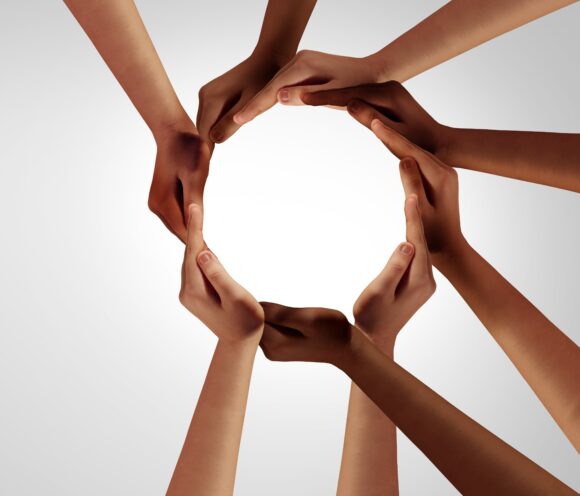A group of Atlanta insurance professionals motivated by the racial justice movement in the wake of the murder of George Floyd exactly one year ago have formed a nonprofit with the mission of improving diversity, equity and inclusion efforts in the region and the insurance industry overall.
The Atlanta Insurance Coalition for Change (AICC)’s vision is to be a “beacon of change for inclusiveness and racial equality in our workplace, industry and community,” the group states on its website.
“We want everyone to feel equally included and valued within our industry. And it takes everyone within our industry to work together to make that happen,” said AICC co-founder and insurance broker Elizabeth Olsson, who has worked in the industry for 30 years.
The new association has become a resource for those in the Atlanta insurance industry who want to support communities of color, she said, but also an outlet and place of action after events within the Atlanta community itself, like the murder of Ahmaud Arbery, an unarmed black man who was fatally shot while jogging, and the recent shootings at Asian-owned businesses.
Through forums and AICC “Conversations for Change” events, Atlanta insurance professionals have the opportunity to share ideas and experiences, but also listen to their colleagues, Olsson said. These forums have all been held virtually so far, but AICC plans to have in-person events once it is feasible to do so.
AICC is also working with other insurance leaders in the Atlanta area to create awareness and conversations about what the industry can do to better to support and recruit people of color. Olsson said insurance professionals in Atlanta want to get involved in supporting communities of color and take action to build diversity in the industry workforce.
“It’s been really heartwarming because I think a lot of people have felt like they haven’t had a place to go,” she said. “People tend to get very vulnerable and very honest in some of our meetings and the feedback that we keep getting over and over is that nobody’s seen anything like this group before. And they can’t wait to get involved.”
The group has grown to about 70 followers since last year and Olsson hopes to eventually reach about 250 to 300 members. There is no cost to join. AICC is currently recruiting for committees that will focus on industry talent recruitment, education, resources and training on diversity, equity and inclusion.
One of AICC’s future goals is to build a recruitment program at Historically Black Colleges and Universities (HBCUs) in Atlanta, and work to attract young talent to the industry.
“We want to get the word out to people that there are tremendous careers available in the insurance industry, whether or not they have a risk management degree,” she said.
AICC made it a priority to build a diverse board that now consists of eight individuals currently in working in the insurance industry. Though Olsson herself is white, she said helping to form AICC was important to her because “Black people have shouldered this burden forever and this is not a problem that Black people created.”
“It’s on me, it’s on everyone. It doesn’t matter that I’m white, the responsibility lies with me,” she said.
Part of that responsibility, she said, is holding the insurers that made public commitments to DE&I efforts accountable. AICC has so far partnered with companies like Aon, Chubb, Gen Re and Willis Towers Watson as corporate “Allies of Change.” She said these companies jumped at the chance to get involved with the group, and interest in what AICC is doing in Atlanta has been growing.
AICC is looking for more company partners and eventually plans to work with them on offering resources and trainings to its members.
But not everyone is on board with the group’s goals. Despite public comments against racism and pledges of support for racial equality, some companies have declined to support the coalition.
“There have been so many either completely silent responses, and in some cases actual, ‘No, we’re not willing to do that,'” she said. “It really speaks to me about how much work there still is left to do.”
The group isn’t focused, however, on those who do not want to be part of its work.
“There’s going to be a portion of the population that will never be willing to really listen, and we understand that. That’s not who we’re going after,” she said. “There are people who are open and are in a place of willingness to listen that they might not have been two years ago, and those are the people we’re trying to reach.”
Related:
- Measuring the Moment: How Will George Floyd’s Death Matter to Insurance Industry?
- Diversity in Insurance Industry Calls For Including Different Mindsets and Experiences
- Moment of Change: How the Insurance Industry Can Bridge the Diversity Gap, Be an Ally
- Why Industry Must Take Measurable Steps to Increase Diversity
Topics Agencies
Was this article valuable?
Here are more articles you may enjoy.



 Florida’s Commercial Clearinghouse Bill Stirring Up Concerns for Brokers, Regulators
Florida’s Commercial Clearinghouse Bill Stirring Up Concerns for Brokers, Regulators  Nine-Month 2025 Results Show P/C Underwriting Gain Skyrocketed
Nine-Month 2025 Results Show P/C Underwriting Gain Skyrocketed  Maine Plane Crash Victims Worked for Luxury Travel Startup Led by Texas Lawyer
Maine Plane Crash Victims Worked for Luxury Travel Startup Led by Texas Lawyer  Insurance Broker Stocks Sink as AI App Sparks Disruption Fears
Insurance Broker Stocks Sink as AI App Sparks Disruption Fears 

